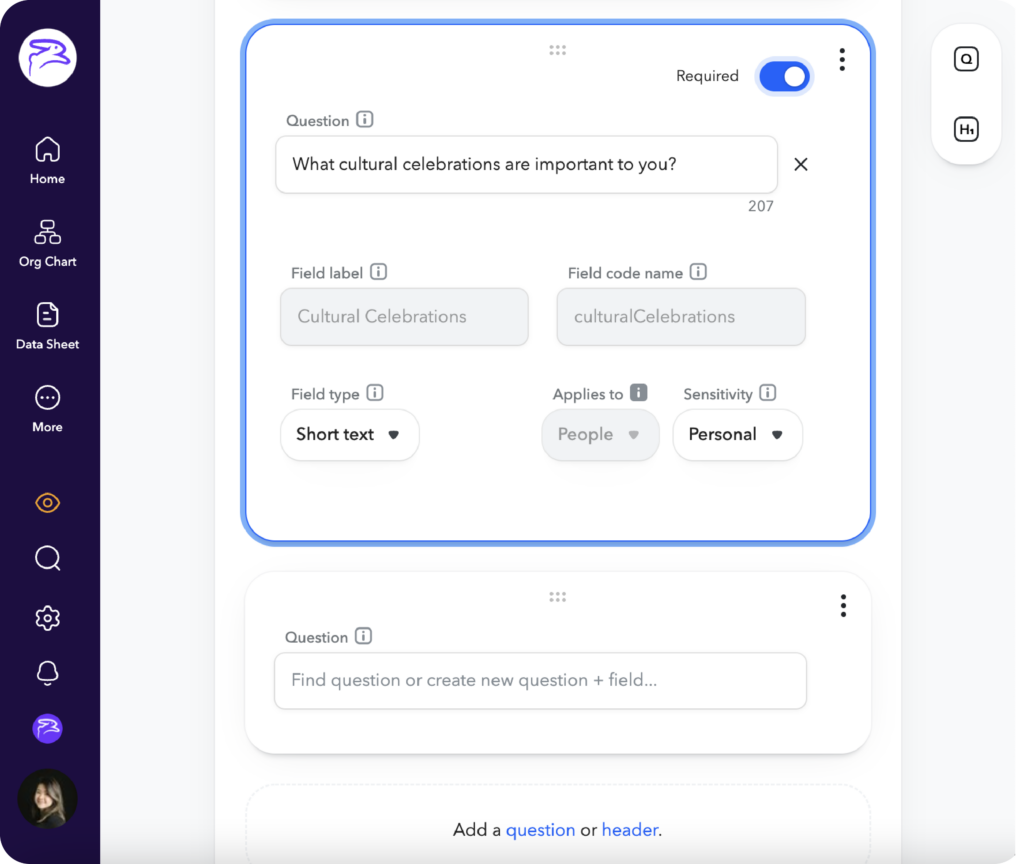
While we think of holidays as times of joy and celebrations, they are also times that can spark grief and loneliness for some people. What’s more, since many holidays revolve around faith-based or cultural beliefs, employees can feel uncomfortable or belittled when certain celebrations receive more attention than others.
Believe it or not, how you choose to celebrate holidays at work impacts your culture and employee experience. When you recognize your people’s backgrounds, you help create a culture of belonging. Alternatively, ignoring your people’s identities may lead to disengagement and increased turnover.
It’s therefore important to ask:
Below are three best practices to celebrate holidays inclusively at work to encourage a sense of belonging and honor your people’s identities.
People decisions are like business decisions: you need data to help prioritize efforts and set a foundation for future success. Therefore, surveying your people – whether it’s throughout the year or during their onboarding – gives you insights into employee needs and requests.
Start by providing an optional space where people can share their identities and preferences. This detail can help the People team plan better programming for employee needs. When employees have the opportunity to disclose their preferences and backgrounds, such as in a self-ID campaign, your People team can use this data to identify opportunities for cultural growth.
Some specific holiday-related questions are:

Leaders can collect pertinent people data through various surveys. The best way to learn what your people want is by asking them. A modern people operations platform allows you to create and send surveys, as well as store your results in one central location.
Your DEIB leaders are there to constantly prioritize your company’s inclusivity efforts. Partnering with DEIB leaders helps focus on programming and initiatives, as well as ensure you use DEIB best practices throughout your organization.
These best practices may include:
What’s more, DEIB leaders can dive further into your people data to help make the best decisions for your people moving forward. Since DEIB is an org-wide effort, DEIB leaders should hold every department accountable to related goals. Ivori Johnson, Director of DEIB at ChartHop, believes formulating benchmarks reinforces accountability and helps educate everyone in your organization on how you’re progressing toward your DEIB goals. She also explains that prioritizing DEIB company-wide “helps cultivate a culture that works toward being more inclusive and welcoming to all people and perspectives.”
And if you don’t have a dedicated DEIB leader, make sure workplace inclusivity is still top-of-mind by making it a responsibility of someone in your executive suite. That way, DEIB has its own priorities and is always a part of the conversation.
It’s important for organizations to value different life experiences, backgrounds, and ways of thinking. When that sense of belonging transcends into holidays and celebrations, you signal to your employees that they’re respected and belong. Ways to do so include offering floating holidays, creating holiday calendars, and establishing educational opportunities.
Eliminate the bias toward national and Christian-centered holidays by offering employees the opportunity to choose which days they want to recognize and celebrate with a day off of work. This allows employees to choose when and how they recognize their specific cultural celebrations.
Bring awareness to different religious, awareness, and inclusion days and events with a company-wide holiday calendar. This will not only create a more informed, sensitive workplace environment, but will also build internal traditions and community.
Also consider incorporating monthly internal communications about upcoming holidays and encourage employees to share how they celebrate. Note: Be cognizant that you cannot share which holidays employees celebrate without permission.
Julie Coffman, Chief Diversity Officer in Chicago for Bain & Company, says that organizations can’t just rely on intentions and messaging to create a culture of inclusion. Instead, she argues, “real, sustainable change comes from doing.” She explains, “Making a more inclusive organization is about employees—and leaders—throughout the organization adopting new mindsets, changing behaviors, and learning to operate in and adapt to new and different systems.”
In order to shift mindsets and behaviors, establish year-round educational opportunities for your people. These activities will bring awareness and help ensure DEIB is prioritized every month, not just mentioned during certain holiday seasons.
Consider embedding the following to support DEIB practices throughout the year:
Work towards creating a more inclusive work environment by focusing on your people. The effect will be two-fold: you’ll not only create a better employee experience, but will also propel your business forward.
When people feel they can show up being their whole self, they’re more likely to be innovative, engaged, and collaborative. Ultimately, when your people feel a sense of belonging, leaders are more likely to see creative solutions, increased retention, and a stronger workplace culture.
Sign up for a free demo today.